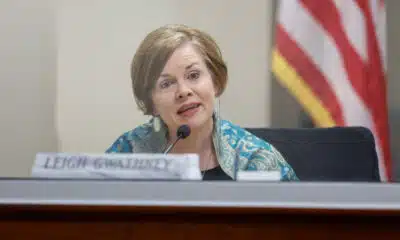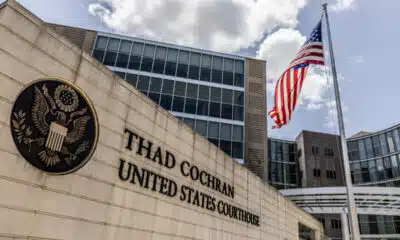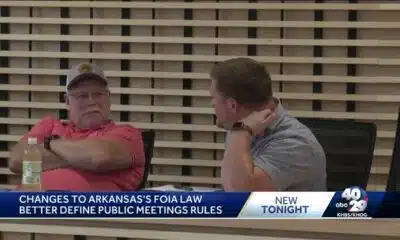News from the South - Louisiana News Feed
Doctors seek conscience protections to provide abortion care in new federal lawsuit • Louisiana Illuminator
Doctors seek conscience protections to provide abortion care in new federal lawsuit
by Sofia Resnick, Louisiana Illuminator
February 7, 2025
About three months into conceiving their second child last fall, the young South Carolina couple was given an earth-shattering prognosis. And two grim choices.
Based on multiple genetic tests and an ultrasound that indicated the baby was not growing normally, a maternal-fetal medicine specialist suspected triploidy, a deadly genetic disorder in which chromosomes are tripled rather than doubled. The couple could wait for their daughter to die in utero or within minutes or hours of being born. Or they could terminate.
But because of a nascent law in South Carolina — which bans pregnancy termination if cardiac activity is detectable on an ultrasound — the couple now had to prove their baby’s condition was fatal in order to qualify for an abortion under the state’s limited exceptions.
The mom, who asked to withhold her name to protect her family’s privacy, said cardiac activity was still audible but the pregnancy was so underdeveloped, the medical team could not extract a sample from the placenta. And when they began debating whether to pull down her uterus, the mom said she and her husband decided to leave the state. Their doctor connected them with a hospital in Virginia, where abortion is legal.
“I feel discouraged from ever trying to do this again,” said the mom, who told States Newsroom that she and her husband wanted the abortion so she could start grieving her lost child and ensure her own health. “I love being a mom. I want kids. I have a beautiful child. But if something like this ever happens to me again, it’s not going to be better, but it could be a lot worse in this new political climate.”
GET THE MORNING HEADLINES.
For some OB-GYNs in South Carolina, denying care to pregnant patients has become a devastating new part of their job. In a first-of-its-kind lawsuit with national implications, a group of OB-GYNs is asking a federal court to overturn the state’s abortion ban on the basis that it does not allow “physicians to provide abortion care mandated by their religious beliefs.”
“Most people go into medicine to provide care and feel very strongly about that, particularly in the field that they have expertise. But as human beings, we also have a conscience and religious beliefs that sustain and nurture what we do in our professional realm,” said Dr. Natalie Dawn Bingham, an OB-GYN who practices in Columbia and who serves as an elder at First Presbyterian Church in Spartanburg.
She is the lead plaintiff among five doctors who say the state abortion law’s exceptions violate the First Amendment’s due process clause for being too vague and violate the free exercise clause. Passed in 2023, the state’s so-called “fetal heartbeat” law effectively bans abortion around six weeks’ gestation, before many women first learn they are pregnant. (In a separate state lawsuit, Planned Parenthood argues the law should actually allow abortions through the ninth week.)
Like similar legislation enacted in Florida, Georgia and Iowa, South Carolina’s law has exceptions for fatal fetal illnesses and if the pregnant person is in danger of death or an “irreversible physical impairment.”
Bingham, who has been practicing in the state since 2005, said these exceptions are poorly defined and difficult to qualify for, sparking debates about whether a fetus destined to die within hours or days of birth still constitutes as having a fatal condition, or whether a maternal diagnosis of cancer or severe hypertension would qualify as a medical emergency. She said the state has turned what were previously medical questions into legal ones, the possible consequences of which include losing one’s medical license, a $10,000 fine, and two years in prison.
To comply with the law, doctors have to report abortions provided under the exceptions and maintain related records for seven years, and they have to provide detailed medical documentation that supports the diagnosis of a fatal fetal anomaly. According to the lawsuit, some of the hospitals where plaintiffs work require consensus from multiple physicians, and many worry their judgment could be later second-guessed by prosecutors or medical board members.
Louisiana, New York leaders spar after doctor indicted for out-of-state abortion pill prescription
“How can you say that you could access these exceptions based on reasonable medical judgment when you already are not respecting the medical judgment of the people making these decisions?” said Bingham, who like the other OB-GYN plaintiffs in the case works with high-risk patients. “Down the line, at any point in time, some arbitrary prosecutor could call that into question, who doesn’t have any medical training.”
In cases of rape or incest, abortion is legal up to 12 weeks’ gestation. The law requires that a doctor tell the patient that a police report must be filed within 24 hours of the abortion. “In a rare instance in which a rape survivor was willing to report the rape to law enforcement, the police insisted on coming to her home to complete the report,” the complaint reads. “The experience was so degrading that the patient permanently left South Carolina.”
The lawsuit also notes that the 12-week limit further precludes rape and incest survivors from accessing abortion under these exemptions because many survivors are children or teenagers and often don’t discover they are pregnant until later. From the law’s effective date in August 2023 through December 2023, fewer than five abortions were provided under the rape or incest exception, according to state health data.
Bingham said the only pediatric and adolescent OB-GYN moved to Virginia over legal issues.
An emerging legal strategy
During his recent confirmation hearing before the U.S. Senate Committee on Finance, Health and Human Services secretary nominee Robert F. Kennedy Jr. agreed when asked by U.S. Sen. James Lankford, R-Oklahoma, if he supported conscience protections for anti-abortion health professionals.
“Forcing somebody to participate in a medical procedure as a provider that they believe is murder does not make any sense to me,” Kennedy replied.
Despite implications to the contrary, there are several federal laws that allow providers to opt out of abortion, including the Weldon Amendment, named after Dave Weldon, President Donald Trump’s nominee to head the U.S. Centers for Disease Control and Prevention.
In recent years, anti-abortion groups have successfully used religious freedom laws as arguments against having to provide or refer for contraception. In 2014 the U.S. Supreme Court ruled in Burwell v. Hobby Lobby Stores, Inc., that the birth control coverage mandate in the Affordable Care Act violated the religious rights of for-profit corporate owners.
In 2020’s Little Sisters of the Poor Saints Peter and Paul Home v. Pennsylvania decision, the Supreme Court upheld the Trump administration’s regulations allowing employers with religious or moral objections to opt out of providing contraceptive coverage to employees.
Filed last month, Bingham v. Wilson is one of the first federal cases to look at doctors’ religious and conscience rights from an abortion-rights perspective.
At a conference of OB-GYNs about 18 months ago, Bingham said she and other physicians began discussing their legal options.
“If there is a right to refuse care, there certainly seems to be the corollary where we have a right to provide care, particularly based on our conscience, and then the tenets of each of our own religions, and based on years of training and dedication,” Bingham said, noting that South Carolina has a conscience law that allows health providers to refuse care.
Her co-plaintiffs include complex family planning specialist and Incarnation Lutheran Church member Dr. Patricia Seal, complex family planning specialist Dr. Jessica Tarleton of Christian and Jewish faith, OB-GYN Dr. Katee Wyant, and an anonymous complex family planning specialist known as Jane Doe. They are represented by the Lawyering Project and the Law Office of Bill Nettles.
“For these five physicians it’s almost every day that they are setting aside their most cherished beliefs,” said Rupali Sharma, founder of and senior counsel at the Lawyering Project. “Their faith commands them to place others before themselves, and so when they don’t provide abortion care to someone who could now suffer long-term debilitating physical or mental health consequences, they feel like they’re putting their license, their families, their freedom from imprisonment above that patient, and that too was something that these physicians just cannot abide by.”
In the lawsuit, plaintiffs ask for the law to be overturned or at least clarified to require law enforcement to defer to a woman’s doctor in the cases excepted under the law. They argue the law discriminates by allowing for some secular exceptions but not religious ones.
New Orleans launches tool to help doctors find reproductive care drug amid tight state restrictions
“South Carolina’s Abortion Ban is neither religiously neutral nor generally applicable,” the complaint reads. “It allows people to terminate potential life for a wide variety of secular purposes. These allowances undermine South Carolina’s purported interest in criminalizing the termination of potential life as much as abortion care compelled by Plaintiffs’ deeply held beliefs would.”
Sharma said that before the 2022 Dobbs decision, the Lawyering Project argued that an Indiana restriction requiring abortion clinics to bury or cremate the remains from all abortions and miscarriages violated the free exercise clause. They successfully blocked the law until 2023, when the injunction was suspended.
Since then, religious progressives have challenged abortion bans in Florida, Indiana, and Kentucky using arguments that their faith compels them to obtain abortions in certain circumstances. The lawsuits in Florida and Kentucky were dismissed for lack of standing while litigation continues in Indiana.
Abortion-law expert Mary Ziegler said that unlike these state lawsuits, the South Carolina doctors might have a better claim of standing because they can cite direct harm, as they’re prohibited from providing care their religion would mandate. But she said that while legal scholarship has grown around the secular versus religious exceptions argument, the legal theory has rarely been tested in court. The University of California Davis law professor noted that in the 2014 Hobby Lobby decision plaintiffs were granted relief even though they weren’t directly administering care.
“It wasn’t like the employer in Hobby Lobby was giving people birth control. There were lots of other steps along the way, whereas in this case the physicians are arguing that they are … not intervening when they feel religiously obligated to,” Ziegler said.
In some of these abortion-rights religious freedom cases, the challenged states have cast doubt on plaintiffs’ sincere religious beliefs.
Sharma says to doubt the religious and conscientious beliefs of her clients is not to understand their jobs.
“It’s about when you see suffering and you’re empowered to stop it, you stop it, right?” Sharma said. “And the idea that these things wouldn’t be central to most faiths, is kind of astounding to me. Of course, abortion and religion are interlinked, because abortion for many people and religion for many people is about you mattering and your life mattering and your family mattering, and being able to preserve those things and protect those things.”
YOU MAKE OUR WORK POSSIBLE.
Louisiana Illuminator is part of States Newsroom, a nonprofit news network supported by grants and a coalition of donors as a 501c(3) public charity. Louisiana Illuminator maintains editorial independence. Contact Editor Greg LaRose for questions: info@lailluminator.com.
News from the South - Louisiana News Feed
All Hail King Clifton – The Current
SUMMARY:
Following a recent star-studded tribute, Clifton Chenier, the “King of Zydeco,” has gained renewed attention. Author Todd Mouton spent 32 years researching Chenier’s life and music, culminating in his new book, The King of Zydeco. Chenier, active from 1955 until his death in 1987, transformed zydeco music and broke racial barriers during segregation. Despite health challenges, he performed passionately, influencing generations. Mouton’s book uncovers new truths about Chenier’s legacy and emphasizes his cultural significance as the trunk of zydeco’s musical tree. The book, released alongside tribute events, celebrates and preserves Chenier’s enduring impact on Louisiana’s musical heritage.
The post All Hail King Clifton – The Current appeared first on thecurrentla.com
News from the South - Louisiana News Feed
Why Texas Hill Country is one of the deadliest places in the US for flash flooding
SUMMARY: Texas Hill Country, known for its rugged landscapes and shallow rivers, is a hotspot for deadly flash floods. On July 4, 2025, a severe flash flood hit this region, rapidly raising the Guadalupe River by over 20 feet within 90 minutes, causing significant fatalities. The area’s steep hills, semi-arid soils, and the Balcones Escarpment contribute to fast-moving floodwaters. Texas leads the U.S. in flood deaths, with many in Flash Flood Alley, spanning from Dallas to San Antonio. Improved flood forecasting, better public education on flood risks—especially for drivers—and road barricades during high flood risks are essential for enhancing safety and reducing deaths.
The post Why Texas Hill Country is one of the deadliest places in the US for flash flooding appeared first on wgno.com
News from the South - Louisiana News Feed
Morning Forecast – Monday, July 7th
SUMMARY: The morning forecast for Monday, July 7th, shows mostly clear skies early with a warm and moist airmass in place, leading to a hot, humid day. Patchy to scattered thunderstorms are expected mainly in the afternoon and early evening, with some lingering after sunset. Moisture, heat, and upper-level disturbances will sustain these storms over the next few days. Temperatures will rise from the low-to-mid 70s in the morning to the low-to-mid 90s by late afternoon, potentially reaching upper 90s in southern and eastern areas. An upper-level ridge will fluctuate but generally promote warming through the week.
Skies are mostly clear, bright and early this Monday morning. A very warm and moist airmass remains in place making for another hot and humid day. Patchy to scattered t-storms are possible for this afternoon. Typical summertime pattern with most of the rain will be concentrated mainly in the afternoon and early evening with a few storms lingering just after sunset. Moisture, daytime heat, and upper level disturbances will keep scattered t-storms in the forecast for the next couple of days. Temperatures will be back up on the climb by the late week into the upper 90’s.
-
News from the South - Louisiana News Feed6 days ago
Attorneys who run public defender offices replaced amid contract turmoil
-
News from the South - Alabama News Feed6 days ago
Gov. Kay Ivey expected to name Alabama parole board pick in coming days
-
Local News7 days ago
Mississippi’s new seafood labeling law takes effect July 1
-
News from the South - Florida News Feed7 days ago
US Senate after overnight debate unable to gain enough votes yet to pass GOP megabill
-
News from the South - Georgia News Feed6 days ago
Officials report average eagle nesting season in coastal Georgia, nearly 200 eaglets fledged statewide
-
News from the South - Kentucky News Feed6 days ago
In small-town Kentucky, finding ‘all the more reason to resist’
-
Mississippi Today6 days ago
Trump nominates Baxter Kruger, Scott Leary for Mississippi U.S. attorney posts
-
News from the South - Arkansas News Feed6 days ago
Centerton prepares for new FOIA law taking effect in August










































